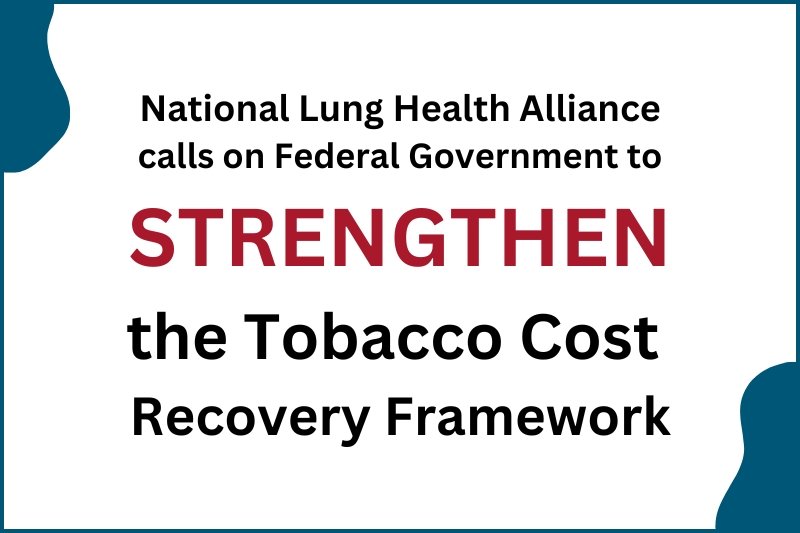Lung Saskatchewan's Role in Advocating for Tobacco Cost Recovery Framework
Lung Saskatchewan advocates and frequently contributes to consultations regarding threats to lung health.
We were proud to lead on the Submission for the Proposed Tobacco Cost Recovery Framework supported by the National Lung Health Alliance—who represent provincial and federal lung health charities, united by a common purpose: to champion vital issues in lung health and drive positive change.
Submission for the Proposed Tobacco Cost Recovery Framework
By: The National Lung Health Alliance (NLHA)
October 4, 2024
Coordinated by: Efthimia Kosmas | Manager, Prevention and Policy | Lung Saskatchewan
National Lung Health Alliance
From: The National Lung Health Alliance on behalf of the National Lung Health Alliance (NLHA)
NLHA Members:
- Nova Scotia and PEI Lung
- New Brunswick Lung
- Lung Health Foundation
- Asthma Canada
- Lung Saskatchewan
- Alberta Lung
- BC Lung Foundation
Re: Consultation on the proposed tobacco cost recovery framework
The National Lung Health Alliance strongly supports the federal regulatory proposal to implement a cost recovery fee on tobacco companies. This fee requires the tobacco industry to provide reimbursement towards the annual cost of Canada’s Tobacco Strategy, which aims to achieve less than 5% of Canadians using tobacco by 2035.2 The implementation of this cost-recovery fee would demonstrate fiscal responsibility through the creation of sustainable funding for tobacco and vapour product reduction and cessation programming. This proposal for the Tobacco Annual Regulatory Charge deserves strong, nationwide support. The tobacco industry has caused the tobacco epidemic, and it should be held accountable.
Tobacco Use in Canada
In 2020, Health Canada reported that tobacco use was linked to the deaths of over 46,000 Canadians and was the leading preventable cause of disease and death in the country, with one in every two Canadians who smoke cigarettes dying prematurely as a direct result of use. In the same year, tobacco use costed Canada approximately $11.2 billion, with this cost having significant impacts on the economy and the country’s healthcare systems. Additionally, vaping products continue to grow in popularity with Canadian youth who are the key users of this addictive and harmful product.1
Incorporating Vaping Industries within the Cost Recovery Framework
The proposal should be strengthened by recovering both tobacco and vaping-related expenditures within the cost-recovery framework as currently, vaping is exempted. It is imperative that vaping companies be included within this framework as we see both youth and adults requiring reduction and cessation programming as the result of using these products. Smoking rates among youth in Canada remain low, but youth are much more likely to vape in comparison to adults.3 Although 9.8% of Canadian youth aged 15-19 have tried smoking, 30% have tried vaping.3 Most vapour products contain nicotine, which is a highly addictive chemical that results in physical dependence to the product and promotes continued to exposure to harmful chemicals.4 Nicotine is particularly harmful to developing bodies and minds, as exposure during adolescence can negatively impact brain development, memory, and ability to concentrate.4 In addition, studies have found that people who vape are more likely to start smoking than people who do not vape.5 It is imperative vaping is included within this cost-recovery framework to protect Canadians, particularly youth, from nicotine addiction and provide targeted resources and programs to aid in nicotine cessation.
Conclusion
To help Canada achieve their Tobacco Strategy target of less than 5% tobacco use by 2035, it is important that this regulation be implemented as soon as possible.2 The proposal states that the regulation will come into force on October 1st, but does not state whether this will be October 1st, 2025 or October 1st, 2026. It is essential that the regulation come into force on October 1st, 2025, so that the cost-recovery fee can begin to be collected from both tobacco and vaping industries to help strengthen Canada’s Tobacco Strategy via product reduction and cessation programming.
References
3) https://www.statcan.gc.ca/o1/en/plus/5339-smoke-20th-century-may-be-clearing-vaping-clouds-are-rise
4) https://gazette.gc.ca/rp-pr/p2/2021/2021-06-23/html/sor-dors123-eng.html
5) https://www.canada.ca/en/health-canada/services/smoking-tobacco/vaping/risks.html
Who we are:
The National Lung Health Alliance (NLHA) represents provincial lung associations and federal lung health charities, united by a common purpose—to champion vital issues in lung health and drive positive change.
Our Commitment:
With representation and networks from across Canada, we are committed to working with all levels of government, communities, healthcare professionals, researchers, advocates and Canadians to better lung health. We are uniquely positioned to advise, conduct consultations and offer programs to help the federal government improve Canadians health and build a more resilient healthcare system.
NLHA Member organizations and representatives:
- Lung Association of Nova Scotia and PEI – CEO Robert McDonald
- New Brunswick Lung – CEO Melanie Langille
- Lung Health Foundation – CEO Jessica Buckley
- Asthma Canada – CEO Jeffery Beach
- Lung Saskatchewan – CEO Erin Kuan
- Alberta Lung Association – CEO Leigh Allard
- BC Lung Foundation – CEO Chris Lam




